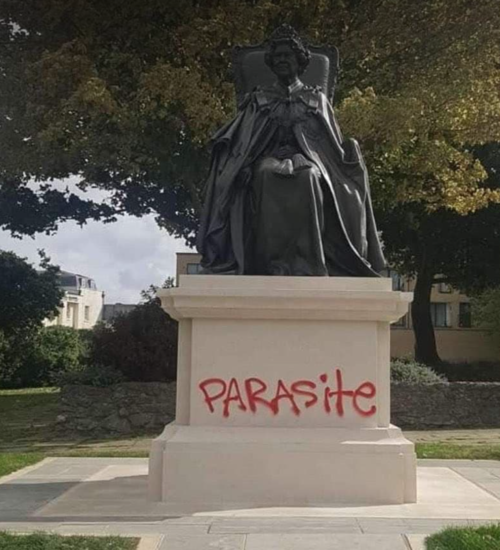Let’s not ignore the elephant in the room when it comes to “mourning” the queen. Because, for the better part of her reign, she was billed as something of a stoic parasite (see: the “Sovereign Grant”). Which is, in effect, what all royals can’t help but being (again, the “Sovereign Grant”). And since most of them are concentrated in England, all eyes are on that island more than ever as the world watches yet another monarch (arguably, one of the most clueless yet) ascend to the throne.
But it’s, increasingly, a crumbling and decayed one. A reality that the British appear to want desperately to ignore as much as the fact that they’ve gained a Thatcherite in Liz Truss the same month as losing the only “calming,” steady presence they’ve had for the past seventy years amid constant economic and environmental catastrophes (for, even before the wrath of twenty-first century climate change, Britain was poisoning its population with industrial pollution). Ones that have frequently been pushed aside thanks to the quintessential “stiff upper lip” that the nation has come to embody and be proud of.
That stiff upper lip was something Elizabeth II herself was only too known for. Especially during the period after Princess Diana died in August of 1997. So beloved (despite being complicit in chilling with Armand Hammer thanks to Prince Charles wanting to cadge some money off the freek-a-leek) was Lady Di that even the normally down-to-be-stoic denizens of England had to remind the queen that, believe it or not, she was a human (technically). And therefore expected to show a bit more emotion over this extraordinary tragedy. But it took much cajoling to get the sovereign to actually address the nation’s state of mourning (far more mournful than it has been about Her Majesty’s own death, to be frank), which she finally did a week after Diana’s fatal August 31st car crash.
Defying her “duty” to be forever silent and “neutral,” the queen stated, “What I say to you now, as your queen and as a grandmother, I say from my heart. First, I want to pay tribute to Diana myself. She was an exceptional and gifted human being. In good times and bad, she never lost her capacity to smile and laugh, nor to inspire others with her warmth and kindness.” These two qualities having always been decidedly lacking within the House of Windsor specifically, and among royalty in general.
Giving Diana the “gift” of treating her like a royal (a position she actually loathed), the House of Windsor was “gracious” enough to break with protocol and have the Royal Standard draped over her coffin despite no longer holding her title (yet someone like Prince Andrew can keep his). But the splashy, newspaper-drenched questions that were asked before this sudden “outpouring” of “affection” from the royal family had always been there: “Where Is Our Queen?” and “Show Us You Care” being among the headlines that sought to highlight the coldness of the long-standing monarch.
That it took Tony Blair to intercede and plead with the queen to speak to her was really saying something. This being such a historical moment that it was immortalized in Stephen Frears’ 2006 film, The Queen. A movie that, incidentally, addressed the long-standing “issue” (for royals) of republicanism. A word that does not mean the same thing that it does to Americans, instead referring to the political movement that wishes to replace the monarchy with a, let’s say, more socially relevant form of governance. And perhaps one that is not quite so rooted in benefitting from colonialism.
Reigning a total of seventy years and two hundred fourteen days, it thusly almost seemed that part of Elizabeth’s “motive” in staying alive for so long was to prevent the monarchy from disintegrating, knowing full well as Britain’s most beloved royal, that anyone who came after her would not be able to compare. Least of all the non-charismatic Charles.
In truth, the Queen appeared almost determined to never let him reign, preferring perhaps that William go straight to the top of the list in terms of candidates to succeed her. In truth, however, no one should. And this would have been a golden opportunity to let the monarchy die with Queen Elizabeth in lieu of automatically deferring to the rigid protocol that “The Firm” is known for. For if ever there were a perfect chance to “stop and reassess,” the death of such a formidable monarchical institution as Elizabeth would have been it. But no, it’s commitment to “British tradition” as usual.
Because many will ask: what is Britain without the monarchy? But the more appropriate question is: what the fuck kind of country is Britain to still cling to the monarchy? The answer, as indicated by those who constantly rise to power in Parliament or as Prime Minister being: one hopelessly entrenched in the so-called virtue of elitism.






















